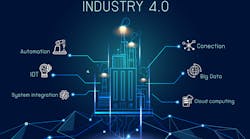The fourth industrial revolution, more commonly known as Industry 4.0, holds tremendous potential for manufacturing companies in numerous industries to enable product customization, provide flexibility to meet new demands in real time, and produce more efficient operations.
As factories prepare for 2020 and beyond, I spoke with Philipp Wallner, Industry Manager, MathWorks, about what’s driving Industry 4.0 opportunities in 2020, including having enough high-quality data, the need for critical low-latency communication, operations optimization, and performance-management technologies. The following outlines our conversation about future factory trends for 2020 and beyond.
AI has been a buzzword for years. How will emerging technologies impact Industry 4.0 applications next year?
In 2020, AI will become an enabler of flexible production. For the past several years, the automation industry has focused on production lines producing one-of-a-kind goods without encountering extended changeover-times. With Industry 4.0, full individualization in production must be accomplished. This means machines cannot be commissioned, parameterized, and tuned for one specific product produced repeatedly for months or even years. Production lines must be flexible. There must also be an AI that parameterizes and tunes machines according to the next, individualized good manufactured on the line.
Simulation has played a large role in manufacturing. Are there any evolutions in the technology we can expect as the industry transitions to Industry 4.0?
Designing and testing physical machines has become more difficult, if not impossible, due to software complexity and the growing number of possible combinations of modularized software components. To counter, companies will perform virtual commissioning of the software to verify the absence of errors and validate if requirements are met based on simulation models before the physical production line is even in place. Companies, such as Reishauer AG, a producer of high-precision gear grinding machines, are already using multidomain simulation models for virtual commissioning today.
What advances in network communications will take place with the growth of connected machines?
As the industry transitions toward Industry 4.0 and IoT, there will be more emphasis on developing unified standards like OPC UA TSN that will help in ensuring interconnectivity between machines and modules in the factory. To meet these standards, a combination of several technologies that enable data to be transmitted in real-time across manufacturers in compliance with an industry-wide standard will ensure equipment from different vendors interoperates seamlessly.
The emergence of 5G and advanced Wi-Fi will replace inflexible cables— enabling a more flexible factory floor. Machines will not only connect with each other but also to cloud systems where advanced calculation power is running powerful algorithms on business and engineering data.
With this increase in data and machines connected to the cloud, how will companies ensure that the right data will be in place at the correct time to catch critical operations status updates?
Increased calculation power realized by industrial controllers and edge-computing devices, as well as the use of cloud systems, will help achieve a new dimension of software functionality on production systems. Edge computing will enable AI-based algorithms to be better optimized throughout the production line—ensuring notification of faulty operations in time to avoid serious problems while minimizing the consumption of energy. Predictive maintenance will evolve and be able to consider data from multiple factories and equipment from different equipment vendors.
With Industry 4.0, the focus is often on automation and algorithms. But what impact will the industry have on people working in factories in 2020?
There will be more opportunities for smart engineers. More technology and tools like MATLAB will enable engineers and scientists (not just data scientists) to work with technologies enabling Industry 4.0, such as AI. Engineers will be required to build models, deal with large data sets, and handle the respective development tools to best address the trends outlined above. Companies will be looking for skilled engineers to prepare for a future in which Industry 4.0 reflects just the beginning of factory evolution.
As industry manager for the industrial automation and machinery field at MathWorks, Philipp Wallner is responsible for driving the business development of this industry segment that comprises energy production, automation components, and production machines. Prior to joining MathWorks, Philipp worked in the machine builder industry, where he held different engineering and management positions. He has a M.S. in electrical engineering from Graz University of Technology and an executive MBA in project and process management from Salzburg Management and Business School.


